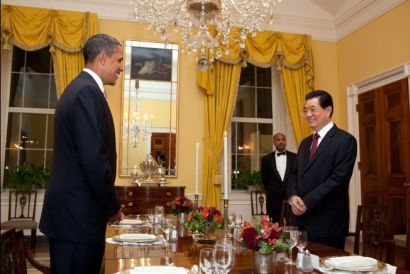Der Standard, Germany
Between America
and China: A 'Balance of Financial Terror'
"The
Bank of China holds more than $2 trillion in foreign currency reserves. Just as
China has no interest in allowing the yuan to appreciate by ten percent, as the
U.S. demands, it also has no particular desire to send the dollar into a
tailspin with all sorts of crises. Both of these actions would result in
enormous losses."
By Christoph Prantner
Translated By Stephanie Martin
January 20, 2011
Austria - Der Standard - Original Article (German)
Smile, smile and smile once
more. That isnít just the diplomatic formula applied by Barack Obama and Hu
Jintao during their meeting today. Itís also an expression of the insecurity
and mistrust that the sole remaining superpower and its emerging challenger
harbor toward one another.
Hiding behind the wolfish
grins, of course, is a rivalry. However, it's by no means a rivalry comparable
to one during the Cold War, as intimated by President Hu prior to his state
visit to the United States. China is no longer an alternative system to the U.S.',
having long since become a champion of global capitalism in its own right -
with all the consequences and mutual dependencies that come with it.
Take for example the value of
the dollar and U.S. government debt: In the United States, many people fear
that Beijing could simply buy the notoriously indebted U.S. On this issue,
there is something of a balance of financial terror. The Bank of China holds
more than $2 trillion in foreign currency reserves. Just as China has no
interest in allowing the yuan to appreciate by ten percent, as the U.S.
demands, it also has no particular desire to send the dollar into a tailspin
with all sorts of crises. Both of these actions would result in enormous losses.
In addition, a considerable percentage of Chinese exports are destined for the United
States, and Americans would in turn like to increase their own direct
investments in China.
Itís true that in many respects,
the Americans and Chinese arenít on the best of terms - keywords: human rights
and arms buildup. But they are nonetheless condemned to a partnership, the
cautious and awkward beginnings of which were just observed in Washington.

Presidents Hu Jintao and Barack Obama prepare for a
private dinner at the White House, January 18.
[CLICK HERE
OR CLICK PHOTO TO FOR SLIDE SHOW]
However, this partnership is
still miles away from being a G-2, that is, two large and economically powerful
countries that virtually rule the world on their own, and for whom the G-8 and
the G-20 are needed only as political window-dressing. For that, Washington is
not yet weak enough, and China is not yet strong enough. †††
Posted by WORLDMEETS.US
Chinese researchers, and not
only them, have strong doubts that this will ever occur. Da Wei, Professor at
the Chinese Institute for International Relations in Beijing, recently wrote
that the U.S. will secure its hegemony through its ideology, because that was how
it was able to define democracy and the market economy as the norm. On the
other hand, it is only the ďstudent'sĒ role which will fall to China. According
to Da Wei, China must understand this for its rise to even amount to more than
an improvement in material wealth.
That Obama and Hu should
cross swords ideologically or make plans beyond the short term is unlikely. It's
enough of a challenge for them to begin the process of rapprochement, keep it
going, and prevent it from getting out of control. Thatís because unlike the political
leaders of both countries, the publics in each country have a much simpler view
of the complex relationship. In America they fear the Yellow Peril, and in
China, officials often foment nationalism by mercilessly criticizing the United
States.
Seen from this perspective, a
smile in U.S.-China relations may be awkward and noncommittal. But that's not
the worst signal - for Europe included.
CLICK HERE FOR GERMAN VERSION
[Posted by WORLDMEETS.US January 23,
2:53pm]

